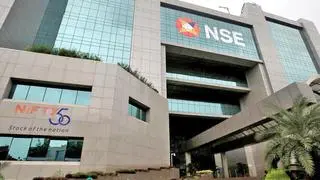While TCS’ revenue growth in the last two years was underperforming in comparison to that of close peers Accenture and Infosys, one thing that had set it apart was its ability to meet operating margin expectations, which was also at industry leading levels. However, with its operating margins missing expectations for June 2022 quarter and coming in at multi quarter lows, it should trigger concerns amongst investors. This concern is partly reflected in the stock which is down 4 per cent so far today, after results were announced post market hours on Friday.
Disappointing earnings growth
June quarter operating margins at 23.1 per cent was below consensus expectations by around 50 basis points. Operating income missed consensus expectations by three per cent and this flowed through to EPS as well which at ₹25.90, was four per cent below consensus.
Revenue at ₹52,758 crore was inline with expectations and up 16.2 per cent year on year. Constant currency growth was at 15.5 per cent. While revenue grew in double digits, growth in net income was sub-par at just around 5 per cent. Without benefits of rupee depreciation, it would have been lower.
While management expects to claw back the decline in operating margins over next three quarters, it is now clear that it is going come in lower than expected for FY23, even with improvement from here.
There were a few other concerns from the results as well. Last twelve month attrition rate has moved up to 19.7 per cent versus 17.4 per cent in March. While some of the increase may be seasonal, it also reflects continuing supply side pressure when it comes to talent and challenges in retaining employees. This may continue to negatively impact margins for another quarter or two.
Another concern is also that deal wins at $8.2 billion was flattish on a year on year basis and down almost 30 per cent on a sequential basis. While management pointed out that the previous quarter had significant large wins that are not recurring, given the current global macro economic context of global slowdown, this too can create some doubts on sustainability of current revenue growth rate.
With regard to impact due to current macro uncertainties, the management noted that at present there is no sign of slowdown in IT spending, but that they remain vigilant. Against this backdrop, the next two quarters will be crucial to track and watch.
What this means for the stock
At BL Portfolio we had recommended to sell the TCS stock in March this year given its pricey valuation which in our view was unsustainable. Its recent quarter performance validates this view and brings to focus the stark gap between its pricey valuation and fundamental performance.
The current price values the stock at 27 times FY23 earnings—a near 10 percent premium to its 5 year average valuation and a 15 per cent premium to industry leader Accenture. Both premiums are unsustainable. Paying 27 times for a company that grew earnings by just 5 per cent in its recent quarter, a five year EPS CAGR of just 10 per cent, and with expected earnings growth for few years at around the same level, does not sound like a good deal for investors.
Till two years back, TCS used to trade at discount to Accenture. The premium valuation it has got since then is not justified by fundamentals. Accenture has continued to outperform TCS in fundamental performance in the last two years. Even in its most recently concluded March quarter, Accenture grew revenues at a solid 22 per cent on USD terms, versus TCS’s 10 per cent.
While Accenture results may have had around five per cent benefit from acquisitions, even adjusted for that, its growth is far superior to that of TCS. Accenture EPS grew 16 per cent in USD terms year on year. TCS earnings were flat in USD terms year on year.
It also needs to be noted that TCS estimates are getting cut post results and when this is fully reflected in consensus estimates, its valuation will be even more expensive and at a premium.
These factors, combined with concerns on impact of economic slowdown in TCS’s business will pressure the stock and its premium valuation. Investors must wait for more correction in the stock before considering investing.








Comments
Comments have to be in English, and in full sentences. They cannot be abusive or personal. Please abide by our community guidelines for posting your comments.
We have migrated to a new commenting platform. If you are already a registered user of TheHindu Businessline and logged in, you may continue to engage with our articles. If you do not have an account please register and login to post comments. Users can access their older comments by logging into their accounts on Vuukle.